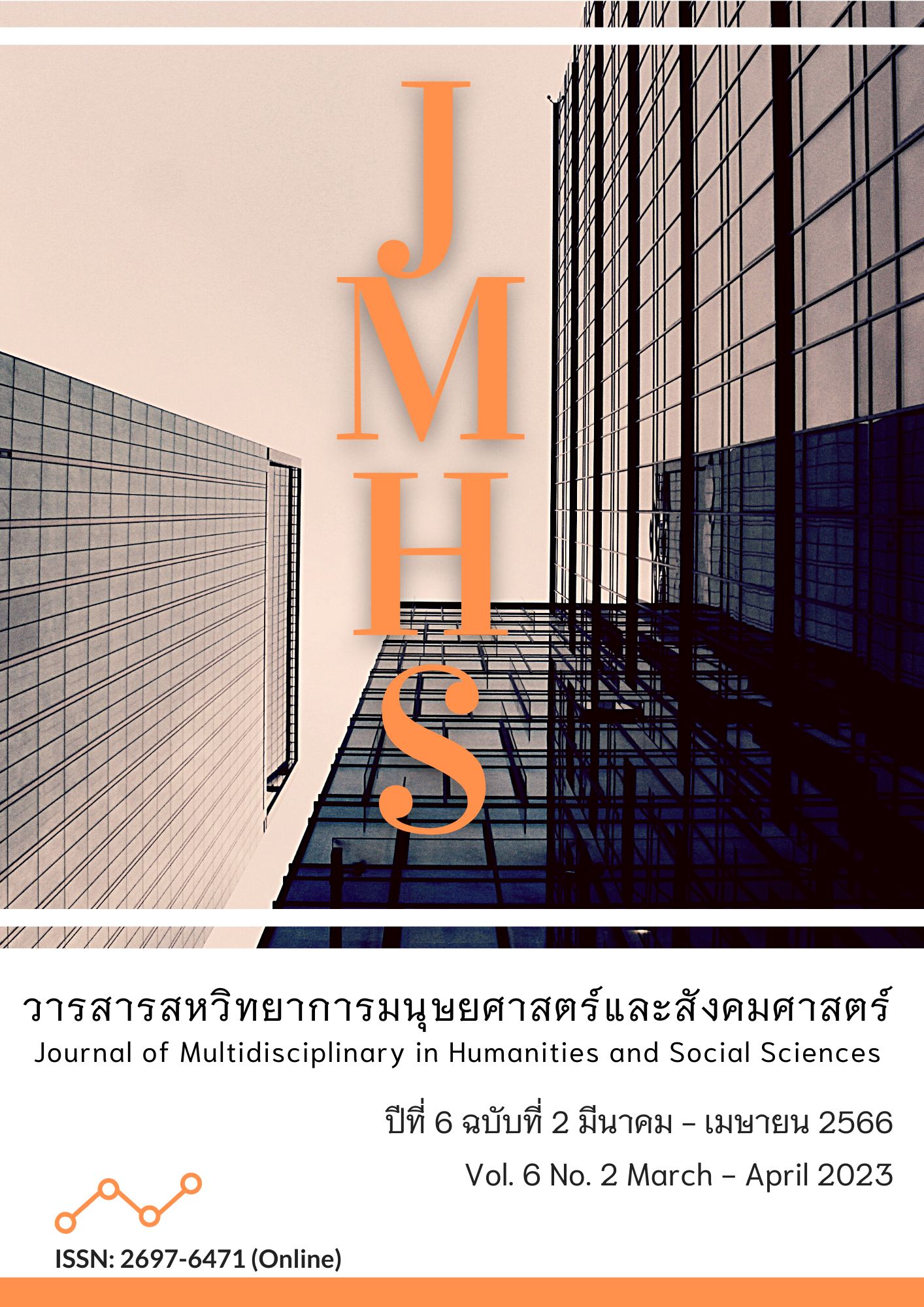Learning Experiences for Money Saving of Grade 4-6 Students at Ban Nong Lang School in Surin Province
Main Article Content
Abstract
This research article aimed to study the learning experiences for money saving of primary education students at Ban Nong Lang School in Surin Province. This research was qualitative and based on a phenomenological approach. The key research informants were divided into two groups: The first group consisted of 10 Grades 4–6 students at Ban Nong Lang School who had experience money saving. The second group consisted of 10 parents who were purposively selected based on selection criteria. The employed data collection tool was an in-depth interview. Research data were analyzed with content analysis to create inductive conclusions in order to answer the research objective. The research findings revealed that the learning experiences for money saving of primary education students at Ban Nong Lang School in Surin Province focused on three main issues: The first main issue was the start of money saving. It consisted of two sub-issues: (1) learning about money saving and (2) starting to save money. The second main issue was the practice of money saving. It consisted of four sub-issues: (1) the money saving method, (2) the money saving model, (3) the target of money saving, and (4) the money expenditure. The third main issue was the lesson obtained from money saving. It consisted of three sub-issues: (1) the perception of the benefits of money saving; (2) the pride of having saved money, and (3) the provision of advice and mouth-to-mouth telling.
Article Details

This work is licensed under a Creative Commons Attribution-NonCommercial-NoDerivatives 4.0 International License.
Views and opinions appearing in the Journal it is the responsibility of the author of the article, and does not constitute the view and responsibility of the editorial team.
References
กระทรวงศึกษาธิการ. (2565, 13 กันยายน). ประกาศกระทรวงศึกษาธิการ เรื่อง นโยบายและจุดเน้นของกระทรวงศึกษาธิการ ประจำปีงบประมาณ พ.ศ. 2566. ข่าว ศธ. 360 องศา. สืบค้นจาก https://www.moe.go.th/360policy-and-focus-moe-2023/
กวิสรา พรปวีณ์. (2554). พลิกชีวิต ด้วยการออมเงิน (สูตรลับความรวย). กรุงเทพฯ: ณัฏฐ์ธนัน.
กัญญ์วรา เศรษฐากิจกุล. (2554). สูตรออมเงิน 4 กระปุก ลอกคราบความจน. กรุงเทพฯ: Good Choice.
กันยา สุวรรณแสง. (2554). จิตวิทยาทั่วไป. กรุงเทพฯ: รวมสาส์น.
คณะกรรมการวิชามนุษย์กับสังคม ศูนย์วิชาบูรณาการ หมวดวิชาศึกษาทั่วไป. (2559). มนุษย์กับสังคม. (พิมพ์ครั้งที่ 13). กรุงเทพฯ: มหาวิทยาลัยเกษตรศาสตร์.
ตลาดหลักทรัพย์แห่งประเทศไทย. (2558). วางแผนออมเงิน. สืบค้นจาก https://www.set.or.th/set/financialplanning/lifeevent.do?innerMenuId=1&name=wealth_saving
ธนาคารกรุงศรีอยุธยา จำกัด (มหาชน). (2564). 6 เคล็ดลับง่าย ๆ สอนลูกรักให้เป็นนักออม. สืบค้นจาก https://www.krungsri.com/th/plearn-plearn/tips-for-teaching-kids-about-saving
ธนาคารออมสิน. (2563). ออมเงินแต่เด็ก โตไปไม่ลำบาก. สืบค้นจาก https://oomtang.gsb.or.th/kms/kms_view/272
บริษัท เวลธ์ มี อัพ จำกัด. (2563). 7 เรื่องเงิน ที่ควรสอนลูก. สืบค้นจาก https://wealthmeup.com/20-07-12-financeforkids/
พิจิตรา นุชนุ่ม. (2558). การให้ความหมายและที่มาของความหมาย กระบวนการออมเงิน ปัญหาและอุปสรรคในการออมเงินตามแนวทางปรัชญาเศรษฐกิจพอเพียงของข้าราชการองค์การบริหารส่วนจังหวัดกาญจนบุรี. วารสารวิชาการ ฉบับภาษาไทย มนุษยศาสตร์ สังคมศาสตร์และศิลปะ มหาวิทยาลัยศิลปากร, 8(1), 398-415.
สมโภชน์ เอี่ยมสุภาษิต. (2549). ทฤษฎีและเทคนิคการปรับพฤติกรรม. กรุงเทพฯ: จุฬาลงกรณ์มหาวิทยาลัย.
สุขใจ น้ำผุด. (2541). การบริหารการเงินสำหรับเด็กในยุค ไอ เอ็ม เอฟ. กรุงเทพฯ: คณะพาณิชยศาสตร์และการบัญชี, มหาวิทยาลัยธรรมศาสตร์.
สุภางค์ จันทวานิช. (2557). วิธีการวิจัยเชิงคุณภาพ. กรุงเทพฯ: จุฬาลงกรณ์มหาวิทยาลัย.
สุรางค์ โค้วตระกูล. (2556). จิตวิทยาการศึกษา. กรุงเทพฯ: จุฬาลงกรณ์มหาวิทยาลัย.
สุรางค์ จันทน์เอม. (2524). จิตวิทยาเด็ก=Child psychology (พิมพ์ครั้งที่ 2). กรุงเทพฯ: อักษรบัณฑิต.
สุวัฒน์ วัฒนวงศ์. (2533). จิตวิทยาการเรียนรู้วัยผู้ใหญ่. กรุงเทพฯ: มหาวิทยาลัยศรีนครินทรวิโรฒ ประสานมิตร.
อัจศรา ประเสริฐสิน. (2563). เครื่องมือการวิจัยทางการศึกษาและสังคมศาสตร์. กรุงเทพฯ: จุฬาลงกรณ์มหาวิทยาลัย.
อินคัมสไปร์. (2564). วิธีออมเงินที่ดีที่สุดสำหรับนักเรียนประถมต้องลอง. สืบค้นจาก https://incomespire.com/วิธีออมเงินที่ดีที่สุด
เอกรินทร์ สี่มหาศาล. (2560). สื่อการเรียนรู้แม่บทมาตรฐานสังคมศึกษา ศาสนาและวัฒนธรรมชั้นประถมศึกษาปีที่ 2 (ฉบับปรับปรุง พ.ศ. 2560). กรุงเทพฯ: อักษรเจริญทัศน์ (อจท.).
Kolb, D.A. (1984). Experiential Learning: Experience as the Source of Learning and Development. Englewood Cliffs, NJ: Prentice Hall.
Magdalena Swacha-Lech. (2022). Pocket Money as One of the Instruments Used to Shape Children’s Financial Attitude and Savings Behaviors. Vision 2025: Education Excellence and Management of Innovations through Sustainable Economic Competitive Advantage, (pp.12784-12805). Retrieved from https://www.wir.ue.wroc.pl/docstore/download/UEWR096dced2004f45a99bcc3c37560d875c/Swacha-Lech_M_Pocket_Money.pdf


